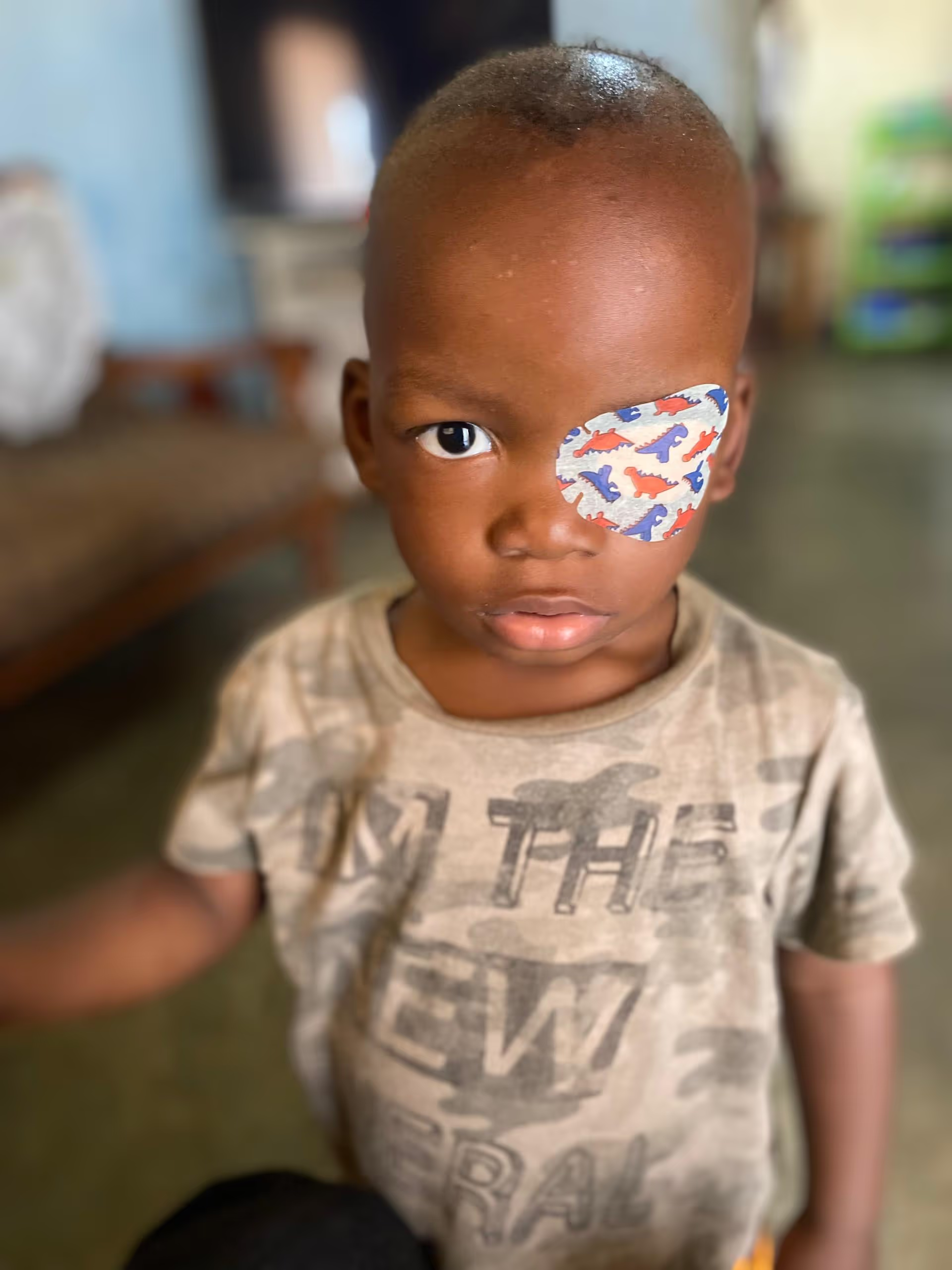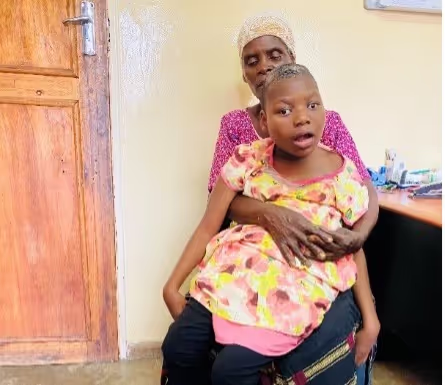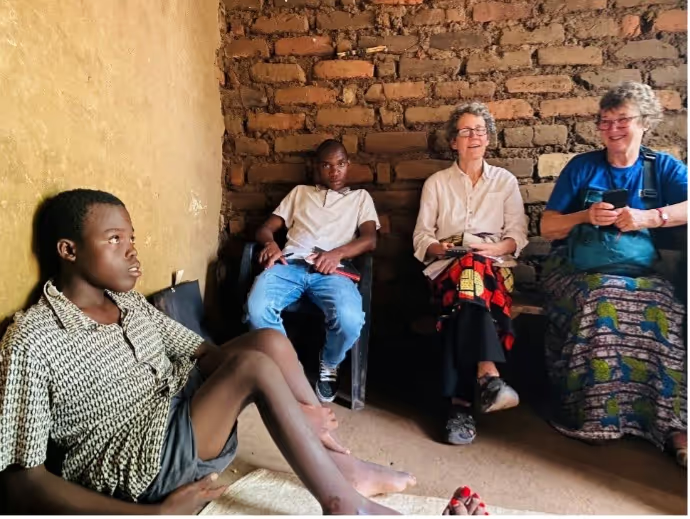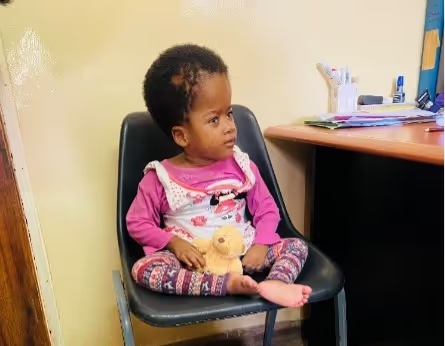PK’s Journey in Pediatric Palliative Care
May 12, 2025
10
min read

PK was a 1-year, 11-month-old child diagnosed with retinoblastoma in 2023. Retinoblastoma is a rare and aggressive form of eye cancer that primarily affects young children. Despite undergoing multiple cycles of chemotherapy, PK’s condition relapsed, signaling that the disease was progressing despite treatment efforts.
Disease Progression and the Need for Palliative Care
As PK’s cancer progressed, it became evident that curative treatments were no longer effective. The Umodzi team stepped in to provide palliative care, shifting the focus from curing the disease to improving the child's quality of life. Adopting a holistic approach, the team ensured that both PK and the family received comprehensive care across four key areas:
Physical Care
As PK’s illness advanced, he began to experience increasing discomfort and distressing symptoms. The Umodzi medical team instituted a tailored pain‐management plan—adjusting analgesics and antiemetics as needed—and monitored his vital signs closely. Through regular assessments and timely interventions, they maintained PK’s comfort, minimized distressing side effects, and ensured he remained as pain-free as possible.
Psychological and Emotional Support
Despite his tender age, PK was acutely aware of the changes around him and could become unsettled by unfamiliar routines and medical procedures. To nurture his sense of security, the Umodzi team incorporated gentle, reassuring interactions into every visit—using age-appropriate play, soothing music, and familiar toys from home. They also worked with the family to maintain PK’s usual bedtime rituals and surroundings, reinforcing a comforting “safe space.”
Recognizing the heavy emotional toll on PK’s parents, who were experiencing anticipatory grief, the team arranged regular counselling sessions. These provided a compassionate forum for them to voice their fears, share memories, and begin to process their grief. Through empathetic listening and guided coping strategies, the parents gained emotional support and practical tools to help them—and PK—navigate this difficult journey.
Social Support
The Umodzi team worked to reinforce PK’s family network, encouraging extended relatives to share caregiving duties and offer emotional support to PK’s parents during this challenging time.
Recognizing the logistical and financial barriers the family faced in travelling to the hospital, the team instituted regular home visits. These visits enabled PK to receive medical attention and companionship in the comfort of his own home, reducing the strain on the parents.
To alleviate economic pressures, the team, with support from World Child Cancer, provided essential household supplies—including soap, staple food items, and transportation vouchers—allowing the family to focus on PK’s care without added financial stress. At the same time, PK continued to receive medical treatment, including chemotherapy, aimed at managing his condition and improving his quality of life. The team also collaborated closely with caregivers to develop individualized meal plans and feeding strategies, ensuring PK received adequate nutrition even as his appetite declined. Additionally, they prioritized his daily comfort, maintaining his cleanliness, warmth, and proper positioning to preserve his dignity and minimize discomfort as his condition progressed.
Spiritual Support
Understanding the profound spiritual and existential challenges facing PK’s parents, the Umodzi team enlisted their chaplain and local faith leaders to offer dedicated support. Through private visits, prayer sessions, and faith-based rituals, these spiritual counselors created a nurturing space for the parents to explore questions of suffering, loss, and hope. By honoring the family’s beliefs and providing compassionate guidance, the team helped them find meaning, comfort, and resilience during PK’s illness and the difficult days that lay ahead.
As PK’s condition deteriorated, the Umodzi team transitioned to end-of-life care, centering on preserving his dignity, comfort, and serenity during his final days. They provided the parents with both emotional support—through compassionate listening and anticipatory grief counselling—and practical guidance on symptom management, positioning, and creating a calm environment at home.
During the team’s final home visit, special attention was paid to surrounding PK with familiar faces, soft music, and his favorite toys. This careful orchestration ensured he was held in loving arms, free from pain, and enveloped in the warmth of his family. By prioritizing peace and presence, the team not only eased PK’s passage but also offered his parents a foundation of support and solace as they navigated their profound grief.
Challenges and Gaps in Care
PK’s journey illuminated several critical shortcomings in the delivery of pediatric palliative care:
- Limited Access to Specialized Services
There is a severe shortage of clinicians trained specifically in pediatric palliative care. Children’s symptom profiles and psychosocial needs differ greatly from adults’, yet most programs are geared toward adult patients, leaving families like PK’s without expert guidance. - Emotional Toll on Healthcare Providers
Caring for terminally ill children and their families places an intense emotional burden on the palliative care team. Without structured debriefing and mental‐health support, providers risk burnout, compassion fatigue, and decreased quality of care. - Barriers to Home-Based Care
Reliable home visits are vital for holistic support, but many families face transportation challenges, limited finances, or a shortage of available caregivers to accompany them—hindering regular outreach by the care team. - Insufficient Bereavement Support
While anticipatory grief counselling is essential, families often lack ongoing psychosocial and community resources after a child’s passing. Continuous bereavement programs are needed to help parents and siblings navigate their loss over time.
By recognizing and addressing these gaps—through expanded training programs, provider wellness initiatives, logistical support for home care, and robust bereavement services—pediatric palliative care can become truly comprehensive and sustainable.







